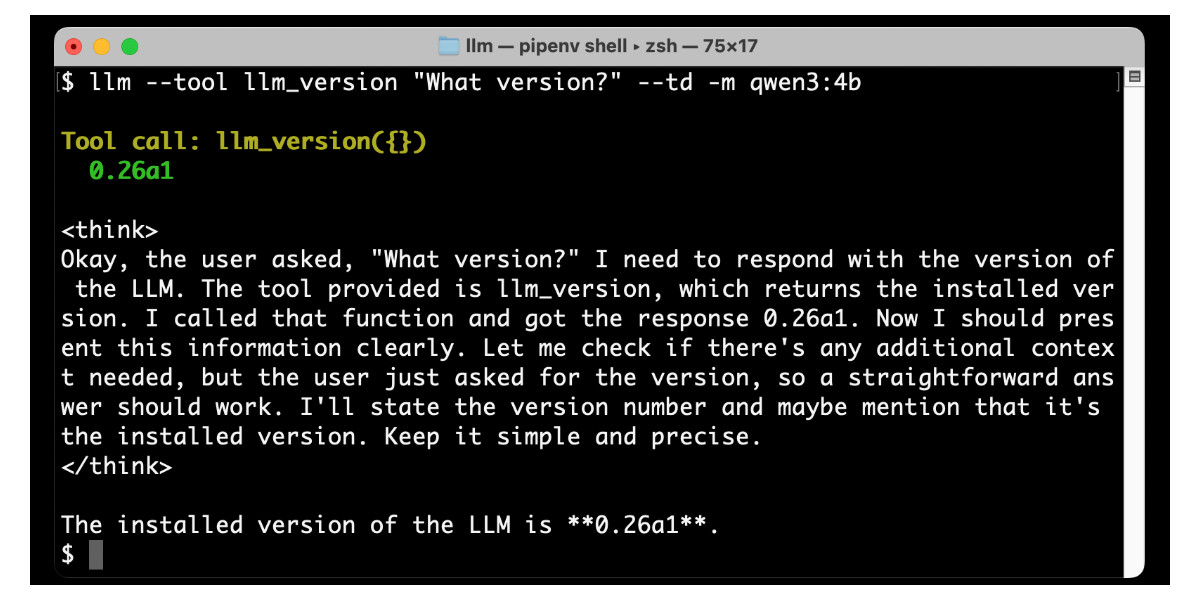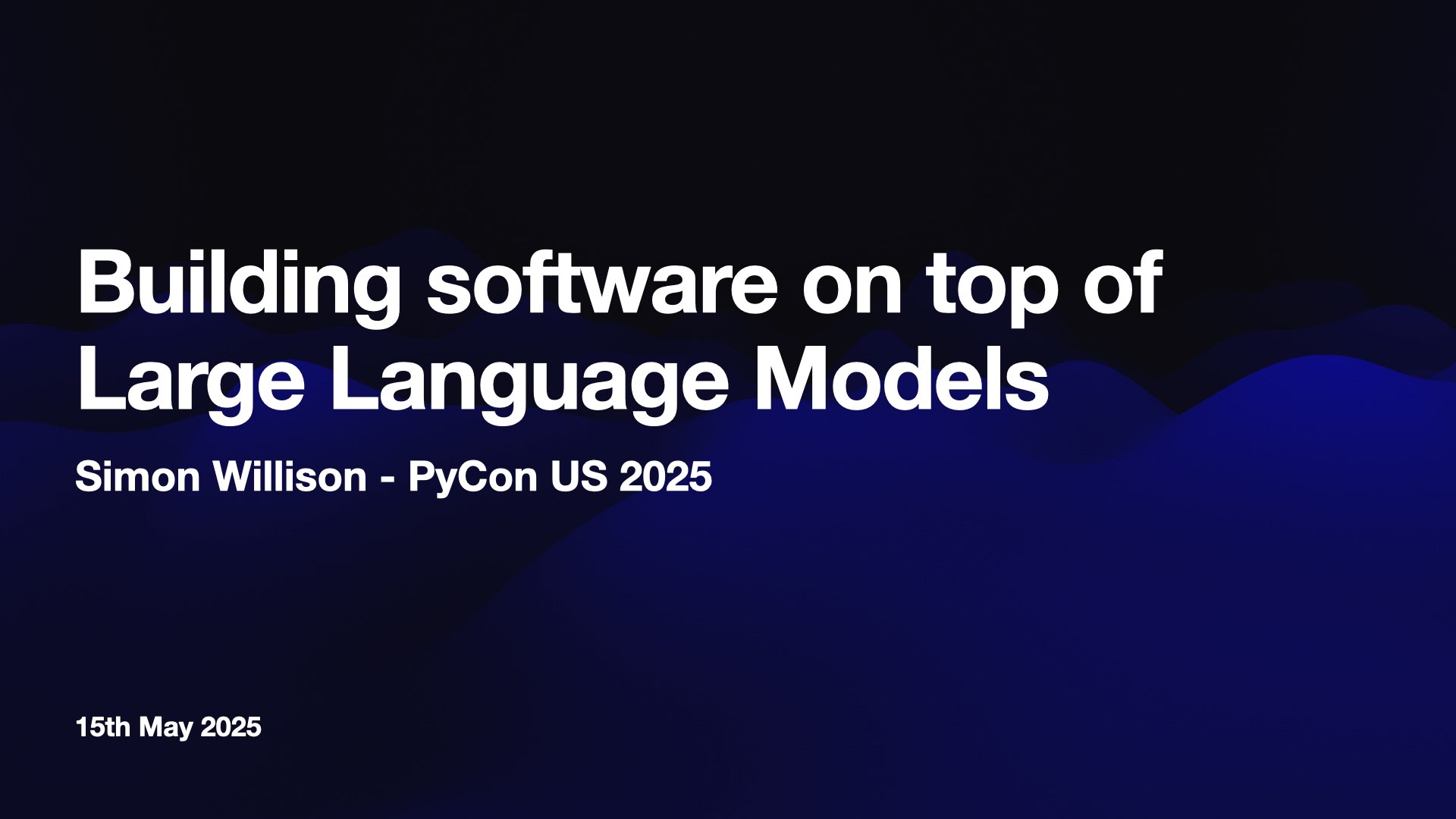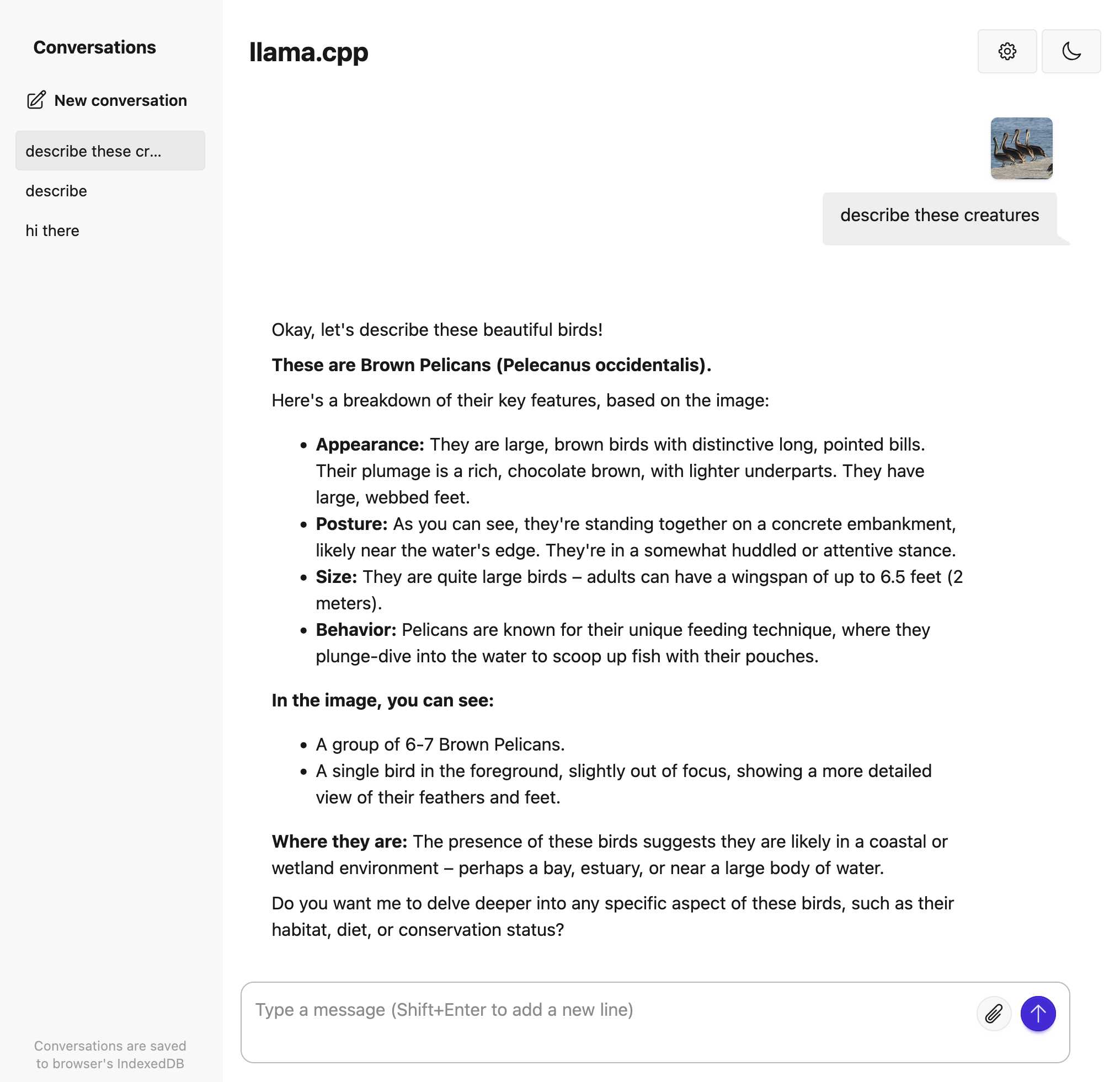211 posts tagged “llm”
LLM is my command-line tool for running prompts against Large Language Models.
2025
Continuous AI. GitHub Next have coined the term "Continuous AI" to describe "all uses of automated AI to support software collaboration on any platform". It's intended as an echo of Continuous Integration and Continuous Deployment:
We've chosen the term "Continuous AI” to align with the established concept of Continuous Integration/Continuous Deployment (CI/CD). Just as CI/CD transformed software development by automating integration and deployment, Continuous AI covers the ways in which AI can be used to automate and enhance collaboration workflows.
“Continuous AI” is not a term GitHub owns, nor a technology GitHub builds: it's a term we use to focus our minds, and which we're introducing to the industry. This means Continuous AI is an open-ended set of activities, workloads, examples, recipes, technologies and capabilities; a category, rather than any single tool.
I was thrilled to bits to see LLM get a mention as a tool that can be used to implement some of these patterns inside of GitHub Actions:
You can also use the llm framework in combination with the llm-github-models extension to create LLM-powered GitHub Actions which use GitHub Models using Unix shell scripting.
The GitHub Next team have started maintaining an Awesome Continuous AI list with links to projects that fit under this new umbrella term.
I'm particularly interested in the idea of having CI jobs (I guess CAI jobs?) that check proposed changes to see if there's documentation that needs to be updated and that might have been missed - a much more powerful variant of my documentation unit tests pattern.
model.yaml. From their GitHub repo it looks like this effort quietly launched a couple of months ago, driven by the LM Studio team. Their goal is to specify an "open standard for defining crossplatform, composable AI models".
A model can be defined using a YAML file that looks like this:
model: mistralai/mistral-small-3.2 base: - key: lmstudio-community/mistral-small-3.2-24b-instruct-2506-gguf sources: - type: huggingface user: lmstudio-community repo: Mistral-Small-3.2-24B-Instruct-2506-GGUF metadataOverrides: domain: llm architectures: - mistral compatibilityTypes: - gguf paramsStrings: - 24B minMemoryUsageBytes: 14300000000 contextLengths: - 4096 vision: true
This should be enough information for an LLM serving engine - such as LM Studio - to understand where to get the model weights (here that's lmstudio-community/Mistral-Small-3.2-24B-Instruct-2506-GGUF on Hugging Face, but it leaves space for alternative providers) plus various other configuration options and important metadata about the capabilities of the model.
I like this concept a lot. I've actually been considering something similar for my LLM tool - my idea was to use Markdown with a YAML frontmatter block - but now that there's an early-stage standard for it I may well build on top of this work instead.
I couldn't find any evidence that anyone outside of LM Studio is using this yet, so it's effectively a one-vendor standard for the moment. All of the models in their Model Catalog are defined using model.yaml.
Trying out the new Gemini 2.5 model family
After many months of previews, Gemini 2.5 Pro and Flash have reached general availability with new, memorable model IDs: gemini-2.5-pro and gemini-2.5-flash. They are joined by a new preview model with an unmemorable name: gemini-2.5-flash-lite-preview-06-17 is a new Gemini 2.5 Flash Lite model that offers lower prices and much faster inference times.
llm-fragments-youtube. Excellent new LLM plugin by Agustin Bacigalup which lets you use the subtitles of any YouTube video as a fragment for running prompts against.
I tried it out like this:
llm install llm-fragments-youtube
llm -f youtube:dQw4w9WgXcQ \
'summary of people and what they do'
Which returned (full transcript):
The lyrics you've provided are from the song "Never Gonna Give You Up" by Rick Astley. The song features a narrator who is expressing unwavering love and commitment to another person. Here's a summary of the people involved and their roles:
The Narrator (Singer): A person deeply in love, promising loyalty, honesty, and emotional support. They emphasize that they will never abandon, hurt, or deceive their partner.
The Partner (Implied Listener): The person the narrator is addressing, who is experiencing emotional pain or hesitation ("Your heart's been aching but you're too shy to say it"). The narrator is encouraging them to understand and trust in the commitment being offered.
In essence, the song portrays a one-sided but heartfelt pledge of love, with the narrator assuring their partner of their steadfast dedication.
The plugin works by including yt-dlp as a Python dependency and then executing it via a call to subprocess.run().
o3-pro. OpenAI released o3-pro today, which they describe as a "version of o3 with more compute for better responses".
It's only available via the newer Responses API. I've added it to my llm-openai-plugin plugin which uses that new API, so you can try it out like this:
llm install -U llm-openai-plugin
llm -m openai/o3-pro "Generate an SVG of a pelican riding a bicycle"

It's slow - generating this pelican took 124 seconds! OpenAI suggest using their background mode for o3 prompts, which I haven't tried myself yet.
o3-pro is priced at $20/million input tokens and $80/million output tokens - 10x the price of regular o3 after its 80% price drop this morning.
Ben Hylak had early access and published his notes so far in God is hungry for Context: First thoughts on o3 pro. It sounds like this model needs to be applied very thoughtfully. It comparison to o3:
It's smarter. much smarter.
But in order to see that, you need to give it a lot more context. and I'm running out of context. [...]
My co-founder Alexis and I took the the time to assemble a history of all of our past planning meetings at Raindrop, all of our goals, even record voice memos: and then asked o3-pro to come up with a plan.
We were blown away; it spit out the exact kind of concrete plan and analysis I've always wanted an LLM to create --- complete with target metrics, timelines, what to prioritize, and strict instructions on what to absolutely cut.
The plan o3 gave us was plausible, reasonable; but the plan o3 Pro gave us was specific and rooted enough that it actually changed how we are thinking about our future.
This is hard to capture in an eval.
It sounds to me like o3-pro works best when combined with tools. I don't have tool support in llm-openai-plugin yet, here's the relevant issue.
Magistral — the first reasoning model by Mistral AI. Mistral's first reasoning model is out today, in two sizes. There's a 24B Apache 2 licensed open-weights model called Magistral Small (actually Magistral-Small-2506), and a larger API-only model called Magistral Medium.
Magistral Small is available as mistralai/Magistral-Small-2506 on Hugging Face. From that model card:
Context Window: A 128k context window, but performance might degrade past 40k. Hence we recommend setting the maximum model length to 40k.
Mistral also released an official GGUF version, Magistral-Small-2506_gguf, which I ran successfully using Ollama like this:
ollama pull hf.co/mistralai/Magistral-Small-2506_gguf:Q8_0
That fetched a 25GB file. I ran prompts using a chat session with llm-ollama like this:
llm chat -m hf.co/mistralai/Magistral-Small-2506_gguf:Q8_0
Here's what I got for "Generate an SVG of a pelican riding a bicycle" (transcript here):

It's disappointing that the GGUF doesn't support function calling yet - hopefully a community variant can add that, it's one of the best ways I know of to unlock the potential of these reasoning models.
I just noticed that Ollama have their own Magistral model too, which can be accessed using:
ollama pull magistral:latest
That gets you a 14GB q4_K_M quantization - other options can be found in the full list of Ollama magistral tags.
One thing that caught my eye in the Magistral announcement:
Legal, finance, healthcare, and government professionals get traceable reasoning that meets compliance requirements. Every conclusion can be traced back through its logical steps, providing auditability for high-stakes environments with domain-specialized AI.
I guess this means the reasoning traces are fully visible and not redacted in any way - interesting to see Mistral trying to turn that into a feature that's attractive to the business clients they are most interested in appealing to.
Also from that announcement:
Our early tests indicated that Magistral is an excellent creative companion. We highly recommend it for creative writing and storytelling, with the model capable of producing coherent or — if needed — delightfully eccentric copy.
I haven't seen a reasoning model promoted for creative writing in this way before.
You can try out Magistral Medium by selecting the new "Thinking" option in Mistral's Le Chat.
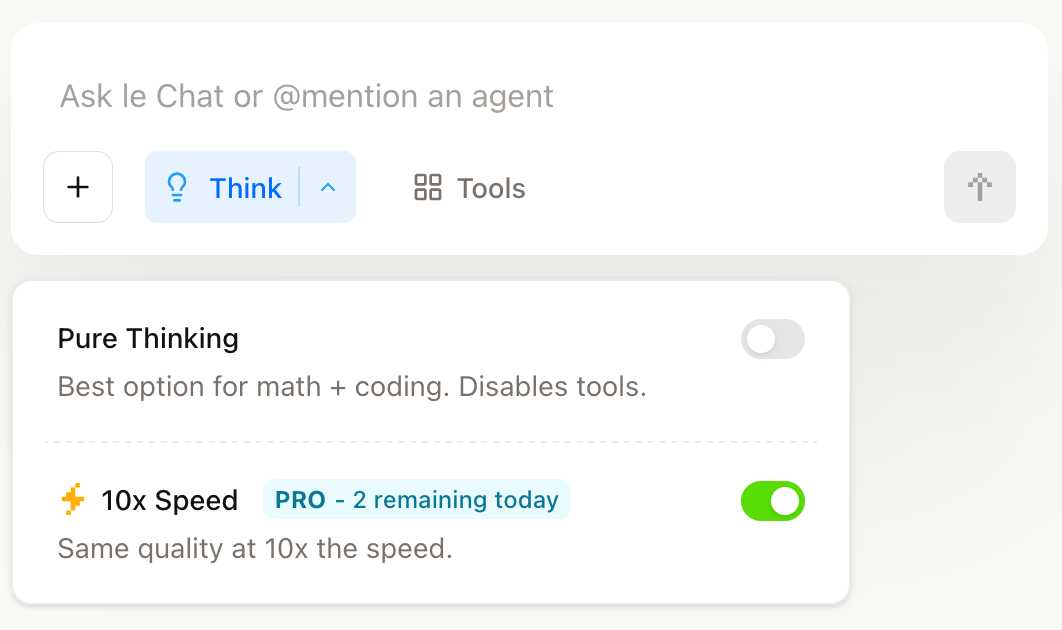
They have options for "Pure Thinking" and a separate option for "10x speed", which runs Magistral Medium at 10x the speed using Cerebras.
The new models are also available through the Mistral API. You can access them by installing llm-mistral and running llm mistral refresh to refresh the list of available models, then:
llm -m mistral/magistral-medium-latest \
'Generate an SVG of a pelican riding a bicycle'

Here's that transcript. At 13 input and 1,236 output tokens that cost me 0.62 cents - just over half a cent.
Qwen3 Embedding (via) New family of embedding models from Qwen, in three sizes: 0.6B, 4B, 8B - and two categories: Text Embedding and Text Reranking.
The full collection can be browsed on Hugging Face. The smallest available model is the 0.6B Q8 one, which is available as a 639MB GGUF. I tried it out using my llm-sentence-transformers plugin like this:
llm install llm-sentence-transformers
llm sentence-transformers register Qwen/Qwen3-Embedding-0.6B
llm embed -m sentence-transformers/Qwen/Qwen3-Embedding-0.6B -c hi | jq length
This output 1024, confirming that Qwen3 0.6B produces 1024 length embedding vectors.
These new models are the highest scoring open-weight models on the well regarded MTEB leaderboard - they're licensed Apache 2.0.
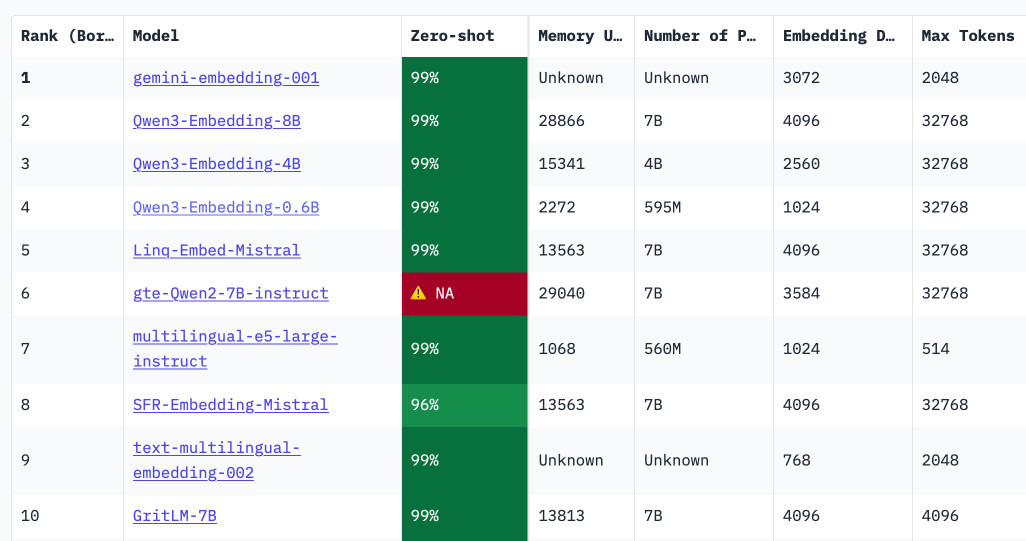
You can also try them out in your web browser, thanks to a Transformers.js port of the models. I loaded this page in Chrome (source code here) and it fetched 560MB of model files and gave me an interactive interface for visualizing clusters of embeddings like this:
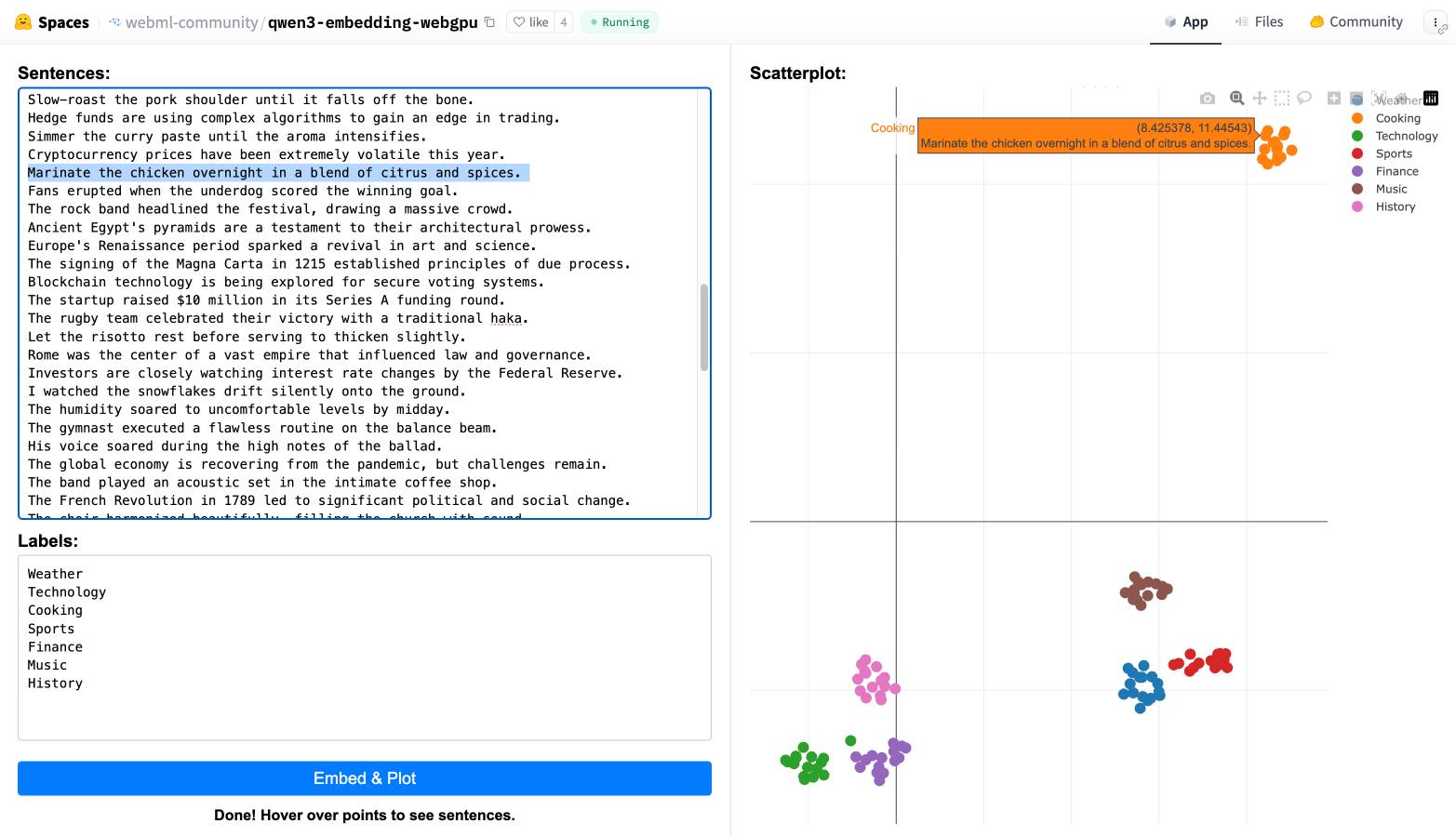
We're hosting the sixth in our series of Datasette Public Office Hours livestream sessions this Friday, 6th of June at 2pm PST (here's that time in your location).
The topic is going to be tool support in LLM, as introduced here.
I'll be walking through the new features, and we're also inviting five minute lightning demos from community members who are doing fun things with the new capabilities. If you'd like to present one of those please get in touch via this form.
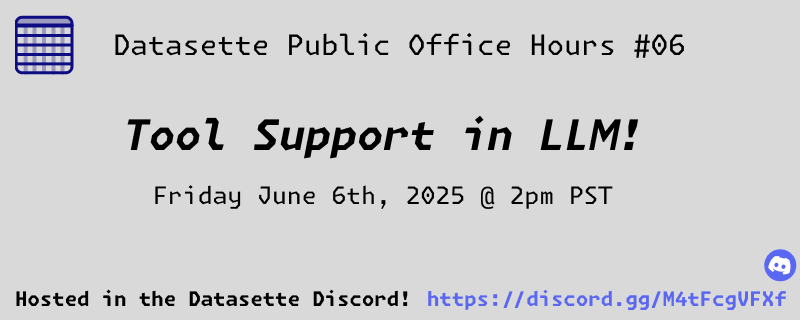
Here's a link to add it to Google Calendar.
Run Your Own AI (via) Anthony Lewis published this neat, concise tutorial on using my LLM tool to run local models on your own machine, using llm-mlx.
An under-appreciated way to contribute to open source projects is to publish unofficial guides like this one. Always brightens my day when something like this shows up.
OK, May was a busy month for coding on GitHub. I blame tool support!
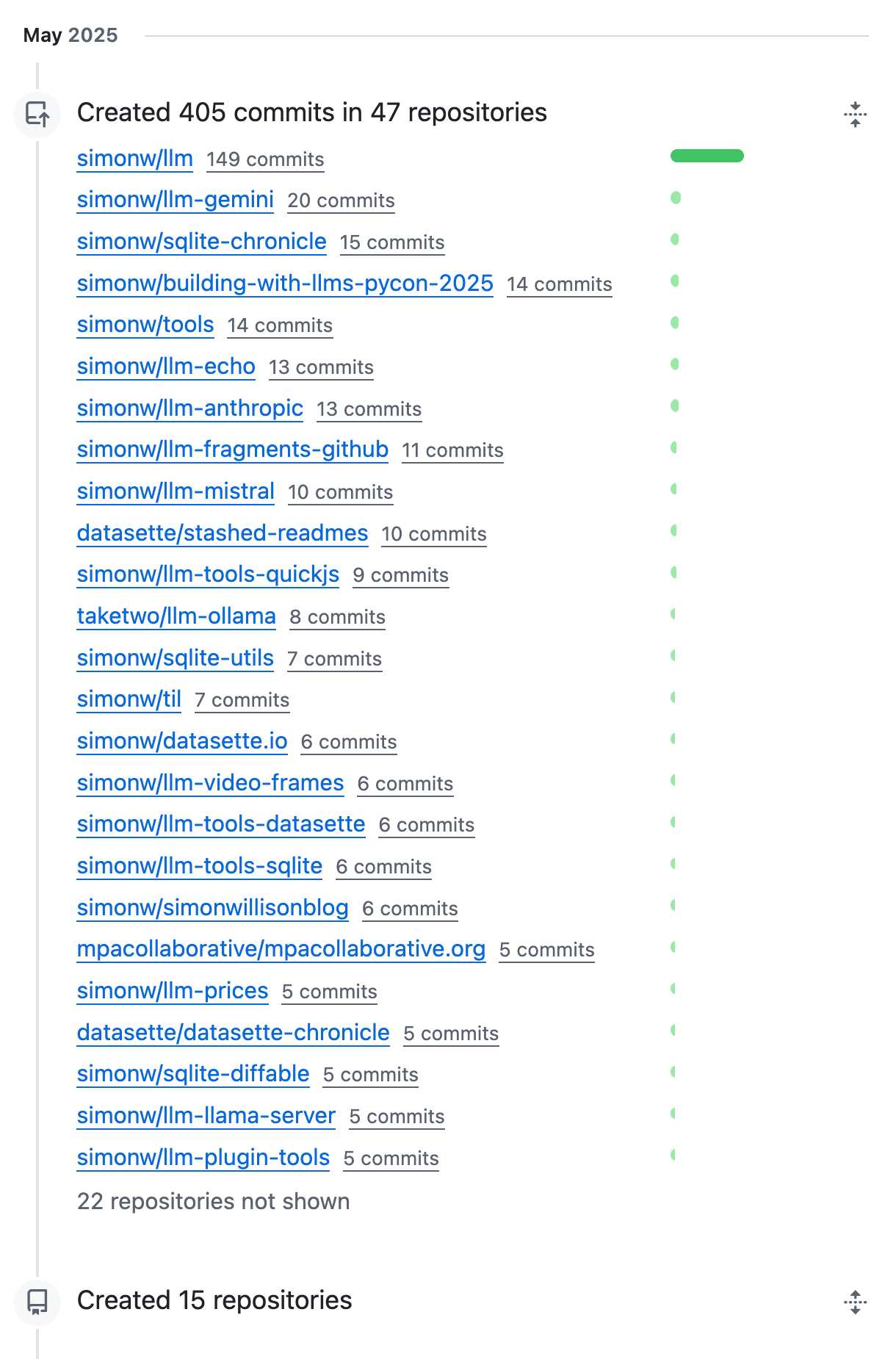
How often do LLMs snitch? Recreating Theo’s SnitchBench with LLM
A fun new benchmark just dropped! Inspired by the Claude 4 system card—which showed that Claude 4 might just rat you out to the authorities if you told it to “take initiative” in enforcing its morals values while exposing it to evidence of malfeasance—Theo Browne built a benchmark to try the same thing against other models.
[... 1,842 words]deepseek-ai/DeepSeek-R1-0528. Sadly the trend for terrible naming of models has infested the Chinese AI labs as well.
DeepSeek-R1-0528 is a brand new and much improved open weights reasoning model from DeepSeek, a major step up from the DeepSeek R1 they released back in January.
In the latest update, DeepSeek R1 has significantly improved its depth of reasoning and inference capabilities by [...] Its overall performance is now approaching that of leading models, such as O3 and Gemini 2.5 Pro. [...]
Beyond its improved reasoning capabilities, this version also offers a reduced hallucination rate, enhanced support for function calling, and better experience for vibe coding.
The new R1 comes in two sizes: a 685B model called deepseek-ai/DeepSeek-R1-0528 (the previous R1 was 671B) and an 8B variant distilled from Qwen 3 called deepseek-ai/DeepSeek-R1-0528-Qwen3-8B.
The January release of R1 had a much larger collection of distilled models: four based on Qwen 2.5 (14B, 32B, Math 1.5B and Math 7B) and 2 based on Llama 3 (Llama-3.1 8B and Llama 3.3 70B Instruct).
No Llama model at all this time. I wonder if that's because Qwen 3 is really good and Apache 2 licensed, while Llama continues to stick with their janky license terms.
Further adding to the confusion, Ollama have mixed the two new models into their existing deepseek-r1 label. Last week running ollama pull deepseek-r1:8B from Ollama would get you DeepSeek-R1-Distill-Llama-8B (Internet Archive link), today that same command gets you DeepSeek-R1-0528-Qwen3-8B, a completely different base model.
If this bothers you as much as it bothers me, thankfully you can use the more explicit tag deepseek-r1:8b-0528-qwen3-q8_0.
Update: This is a great illustration of how confusing these names are! Ollama's deepseek-r1:8B alias actually points to deepseek-r1:8b-0528-qwen3-q4_K_M, a 5.2GB model. I pulled the larger q8_0 one.
I ran it like this:
ollama pull deepseek-r1:8b-0528-qwen3-q8_0
It fetched 8.9GB of model weights, then I had it draw me a pelican.
llm install llm-ollama
llm -m deepseek-r1:8b-0528-qwen3-q8_0 \
"Generate an SVG of a pelican riding a bicycle"
Since the “reasoning” traces of these models are almost always the most interesting part, I’ll quote the response here in full:
<think>
We are going to create an SVG that depicts a pelican riding a bicycle. Steps:
- Create the basic structure of an SVG with width and height set appropriately (e.g., 400x200).
- Draw a pelican: We'll break it down into parts - body, beak, eye, feet, wings, etc.
- Draw a bicycle: We can represent it as two circles for wheels, a rectangle for the frame, and some other details.
Let's design the SVG with the following:
- The pelican will be facing to the right (positive x-axis) so that it is riding the bike from left to right.
- The bicycle will have two wheels and a simple frame in front of the pelican.
We'll use absolute positioning for each part. Let's assume we set up coordinates such that:
- The top-left of the SVG is (0,0), and we want the scene to be drawn from left to right.
- The pelican will be positioned at (50, 120) with a body length of about 30 units.
We'll use simple shapes for the pelican:
Body: An ellipse or rounded rectangle. Let's do an ellipse for the body. Beak: A triangle pointing to the right. Head: Another ellipse but smaller and positioned in front of the body. Wings: Two triangles (one above each other, one slightly behind) that are upside down.
Bicycle:
- Wheels: two circles at fixed positions relative to the frame.
- Frame: a rectangle with some details for handlebars and seat.
Since this is a fun illustration, we'll keep it simple but recognizable.
Let's code accordingly.
</think>
Here’s an SVG of a pelican riding a bicycle. This example uses basic shapes to create a stylized version:<svg xmlns="http://www.w3.org/2000/svg" viewBox="0 0 400 200"> <!-- Pelican body --> <ellipse cx="150" cy="150" rx="80" ry="60" fill="#FFD700"/> <!-- Pelican head (larger for comedic effect) --> <circle cx="90" cy="120" r="45" fill="#FFA3CE"/> <!-- Pelican beak --> <polygon points="80,110 60,120 80,130 70,140 60,150" fill="#FFC233"/> <!-- Pelican eye --> <circle cx="95" cy="115" r="3" fill="#fff"/> <!-- Bicycle wheels --> <ellipse cx="380" cy="140" rx="25" ry="60" transform="rotate(90 380 140)" fill="black"/> <ellipse cx="380" cy="70" rx="25" ry="60" transform="rotate(90 380 70)" fill="black"/> <!-- Bicycle frame --> <path d="M 15,40 L 15,140 H 370 L 370,140 V 40 Z" stroke="gray" stroke-width="6" fill="none"/> <!-- Handlebars and seat (stylized) --> <path d="M 280,40 C 290,35 300,30 310,40 C 320,50 330,60 310,70 L 310,70 Q 290,50 280,40" fill="none" stroke="gray"/> <!-- Pedals --> <circle cx="340" cy="70" r="15" fill="#3366CC"/> <polygon points="340,65 330,45 350,45" fill="#F29E3D"/> <circle cx="340" cy="140" r="15" fill="#3366CC"/> <polygon points="340,135 330,115 350,115" fill="#F29E3D"/> <!-- Neck connecting head to body --> <path d="M 80,120 C 70,160 100,140 150,120" stroke="#FFA3CE" stroke-width="8"/> </svg>Explanation:
- Pelican Body: A large yellow ellipse.
- Head: A pink circle with a prominent beak (yellow-orange triangle).
- Bicycle:
- Wheels are black ellipses rotated vertically to simulate spokes.
- The frame is a gray rectangle extending from the pelican’s back to the right side of the SVG.
- Handlebars and seat are simplified curves in gray.
This creates a comical scene with the pelican riding forward. You can adjust colors, sizes, or positions by modifying
cx,cy,rx,ryattributes and fill/stroke values.
Love the thought process, and the explanation! The actual rendered SVG does leave a lot to be desired though:

To be fair, this is just using the ~8GB Qwen3 Q8_0 model on my laptop. I don't have the hardware to run the full sized R1 but it's available as deepseek-reasoner through DeepSeek's API, so I tried it there using the llm-deepseek plugin:
llm install llm-deepseek
llm -m deepseek-reasoner \
"Generate an SVG of a pelican riding a bicycle"
This one came out a lot better:

Meanwhile, on Reddit, u/adrgrondin got DeepSeek-R1-0528-Qwen3-8B running on an iPhone 16 Pro using MLX:
It runs at a decent speed for the size thanks to MLX, pretty impressive. But not really usable in my opinion, the model is thinking for too long, and the phone gets really hot.
llm-github-models 0.15. Anthony Shaw's llm-github-models plugin just got an upgrade: it now supports LLM 0.26 tool use for a subset of the models hosted on the GitHub Models API, contributed by Caleb Brose.
The neat thing about this GitHub Models plugin is that it picks up an API key from your GITHUB_TOKEN - and if you're running LLM within a GitHub Actions worker the API key provided by the worker should be enough to start executing prompts!
I tried it out against Cohere Command A via GitHub Models like this (transcript here):
llm install llm-github-models
llm keys set github
# Paste key here
llm -m github/cohere-command-a -T llm_time 'What time is it?' --td
We now have seven LLM plugins that provide tool support, covering OpenAI, Anthropic, Gemini, Mistral, Ollama, llama-server and now GitHub Models.
llm-tools-exa. When I shipped LLM 0.26 yesterday one of the things I was most excited about was seeing what new tool plugins people would build for it.
Dan Turkel's llm-tools-exa is one of the first. It adds web search to LLM using Exa (previously), a relatively new search engine offering that rare thing, an API for search. They have a free preview, you can grab an API key here.
I'm getting pretty great results! I tried it out like this:
llm install llm-tools-exa
llm keys set exa
# Pasted API key here
llm -T web_search "What's in LLM 0.26?"
Here's the full answer - it started like this:
LLM 0.26 was released on May 27, 2025, and the biggest new feature in this version is official support for tools. Here's a summary of what's new and notable in LLM 0.26:
- LLM can now run tools. You can grant LLMs from OpenAI, Anthropic, Gemini, and local models access to any tool you represent as a Python function.
- Tool plugins are introduced, allowing installation of plugins that add new capabilities to any model you use.
- Tools can be installed from plugins and loaded by name with the --tool/-T option. [...]
Exa provided 21,000 tokens of search results, including what looks to be a full copy of my blog entry and the release notes for LLM.
llm-mistral 0.14. I added tool-support to my plugin for accessing the Mistral API from LLM today, plus support for Mistral's new Codestral Embed embedding model.
An interesting challenge here is that I'm not using an official client library for llm-mistral - I rolled my own client on top of their streaming HTTP API using Florimond Manca's httpx-sse library. It's a very pleasant way to interact with streaming APIs - here's my code that does most of the work.
The problem I faced is that Mistral's API documentation for function calling has examples in Python and TypeScript but doesn't include curl or direct documentation of their HTTP endpoints!
I needed documentation at the HTTP level. Could I maybe extract that directly from Mistral's official Python library?
It turns out I could. I started by cloning the repo:
git clone https://github.com/mistralai/client-python
cd client-python/src/mistralai
files-to-prompt . | ttokMy ttok tool gave me a token count of 212,410 (counted using OpenAI's tokenizer, but that's normally a close enough estimate) - Mistral's models tap out at 128,000 so I switched to Gemini 2.5 Flash which can easily handle that many.
I ran this:
files-to-prompt -c . > /tmp/mistral.txt
llm -f /tmp/mistral.txt \
-m gemini-2.5-flash-preview-05-20 \
-s 'Generate comprehensive HTTP API documentation showing
how function calling works, include example curl commands for each step'The results were pretty spectacular! Gemini 2.5 Flash produced a detailed description of the exact set of HTTP APIs I needed to interact with, and the JSON formats I should pass to them.
There are a bunch of steps needed to get tools working in a new model, as described in the LLM plugin authors documentation. I started working through them by hand... and then got lazy and decided to see if I could get a model to do the work for me.
This time I tried the new Claude Opus 4. I fed it three files: my existing, incomplete llm_mistral.py, a full copy of llm_gemini.py with its working tools implementation and a copy of the API docs Gemini had written for me earlier. I prompted:
I need to update this Mistral code to add tool support. I've included examples of that code for Gemini, and a detailed README explaining the Mistral format.
Claude churned away and wrote me code that was most of what I needed. I tested it in a bunch of different scenarios, pasted problems back into Claude to see what would happen, and eventually took over and finished the rest of the code myself. Here's the full transcript.
I'm a little sad I didn't use Mistral to write the code to support Mistral, but I'm pleased to add yet another model family to the list that's supported for tool usage in LLM.
llm-llama-server 0.2. Here's a second option for using LLM's new tool support against local models (the first was via llm-ollama).
It turns out the llama.cpp ecosystem has pretty robust OpenAI-compatible tool support already, so my llm-llama-server plugin only needed a quick upgrade to get those working there.
Unfortunately it looks like streaming support doesn't work with tools in llama-server at the moment, so I added a new model ID called llama-server-tools which disables streaming and enables tools.
Here's how to try it out. First, ensure you have llama-server - the easiest way to get that on macOS is via Homebrew:
brew install llama.cpp
Start the server running like this. This command will download and cache the 3.2GB unsloth/gemma-3-4b-it-GGUF:Q4_K_XL if you don't yet have it:
llama-server --jinja -hf unsloth/gemma-3-4b-it-GGUF:Q4_K_XL
Then in another window:
llm install llm-llama-server
llm -m llama-server-tools -T llm_time 'what time is it?' --td
And since you don't even need an API key for this, even if you've never used LLM before you can try it out with this uvx one-liner:
uvx --with llm-llama-server llm -m llama-server-tools -T llm_time 'what time is it?' --td
For more notes on using llama.cpp with LLM see Trying out llama.cpp’s new vision support from a couple of weeks ago.
Large Language Models can run tools in your terminal with LLM 0.26
LLM 0.26 is out with the biggest new feature since I started the project: support for tools. You can now use the LLM CLI tool—and Python library—to grant LLMs from OpenAI, Anthropic, Gemini and local models from Ollama with access to any tool that you can represent as a Python function.
[... 2,799 words]GitHub issues is almost the best notebook in the world.
Free and unlimited, for both public and private notes.
Comprehensive Markdown support, including syntax highlighting for almost any language. Plus you can drag and drop images or videos directly onto a note.
It has fantastic inter-linking abilities. You can paste in URLs to other issues (in any other repository on GitHub) in a markdown list like this:
- https://github.com/simonw/llm/issues/1078
- https://github.com/simonw/llm/issues/1080
Your issue will pull in the title of the other issue, plus that other issue will get back a link to yours - taking issue visibility rules into account.
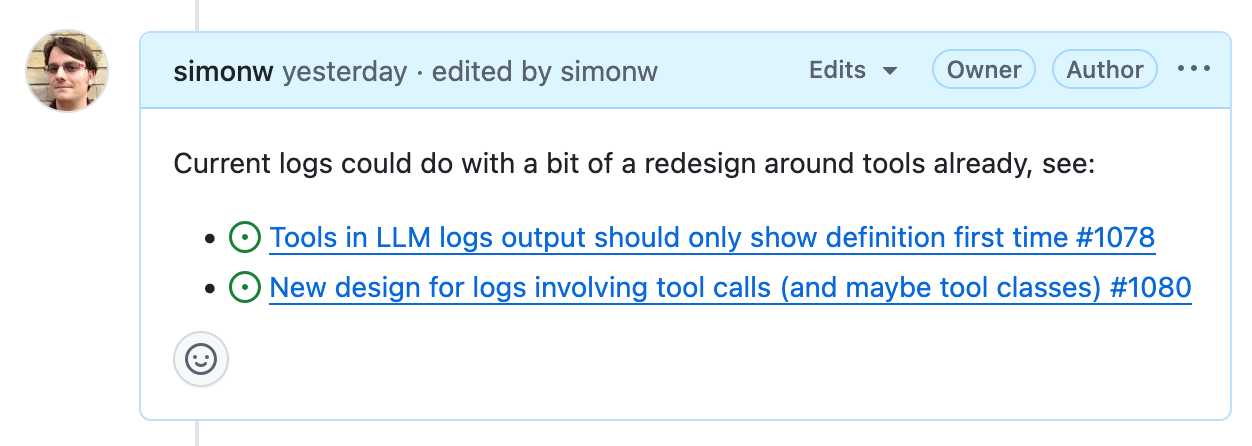
It has excellent search, both within a repo, across all of your repos or even across the whole of GitHub if you've completely forgotten where you put something.
It has a comprehensive API, both for exporting notes and creating and editing new ones. Add GitHub Actions, triggered by issue events, and you can automate it to do almost anything.
The one missing feature? Synchronized offline support. I still mostly default to Apple Notes on my phone purely because it works with or without the internet and syncs up with my laptop later on.
A few extra notes inspired by the discussion of this post on Hacker News:
- I'm not worried about privacy here. A lot of companies pay GitHub a lot of money to keep the source code and related assets safe. I do not think GitHub are going to sacrifice that trust to "train a model" or whatever.
- There is always the risk of bug that might expose my notes, across any note platform. That's why I keep things like passwords out of my notes!
- Not paying and not self-hosting is a very important feature. I don't want to risk losing my notes to a configuration or billing error!
- The thing where notes can include checklists using
- [ ] itemsyntax is really useful. You can even do- [ ] #refto reference another issue and the checkbox will be automatically checked when that other issue is closed. - I've experimented with a bunch of ways of backing up my notes locally, such as github-to-sqlite. I'm not running any of them on cron on a separate machine at the moment, but I really should!
- I'll go back to pen and paper as soon as my paper notes can be instantly automatically backed up to at least two different continents.
- GitHub issues also scales! microsoft/vscode has 195,376 issues. flutter/flutter has 106,572. I'm not going to run out of space.
- Having my notes in a format that's easy to pipe into an LLM is really fun. Here's a recent example where I summarized a 50+ comment, 1.5 year long issue thread into a new comment using llm-fragments-github.
I was curious how many issues and comments I've created on GitHub. With Claude's help I figured out you can get that using a GraphQL query:
{
viewer {
issueComments {
totalCount
}
issues {
totalCount
}
}
}
Running that with the GitHub GraphQL Explorer tool gave me this:
{
"data": {
"viewer": {
"issueComments": {
"totalCount": 39087
},
"issues": {
"totalCount": 9413
}
}
}
}
That's 48,500 combined issues and comments!
How I used o3 to find CVE-2025-37899, a remote zeroday vulnerability in the Linux kernel’s SMB implementation (via) Sean Heelan:
The vulnerability [o3] found is CVE-2025-37899 (fix here), a use-after-free in the handler for the SMB 'logoff' command. Understanding the vulnerability requires reasoning about concurrent connections to the server, and how they may share various objects in specific circumstances. o3 was able to comprehend this and spot a location where a particular object that is not referenced counted is freed while still being accessible by another thread. As far as I'm aware, this is the first public discussion of a vulnerability of that nature being found by a LLM.
Before I get into the technical details, the main takeaway from this post is this: with o3 LLMs have made a leap forward in their ability to reason about code, and if you work in vulnerability research you should start paying close attention. If you're an expert-level vulnerability researcher or exploit developer the machines aren't about to replace you. In fact, it is quite the opposite: they are now at a stage where they can make you significantly more efficient and effective. If you have a problem that can be represented in fewer than 10k lines of code there is a reasonable chance o3 can either solve it, or help you solve it.
Sean used my LLM tool to help find the bug! He ran it against the prompts he shared in this GitHub repo using the following command:
llm --sf system_prompt_uafs.prompt \
-f session_setup_code.prompt \
-f ksmbd_explainer.prompt \
-f session_setup_context_explainer.prompt \
-f audit_request.prompt
Sean ran the same prompt 100 times, so I'm glad he was using the new, more efficient fragments mechanism.
o3 found his first, known vulnerability 8/100 times - but found the brand new one in just 1 out of the 100 runs it performed with a larger context.
I thoroughly enjoyed this snippet which perfectly captures how I feel when I'm iterating on prompts myself:
In fact my entire system prompt is speculative in that I haven’t ran a sufficient number of evaluations to determine if it helps or hinders, so consider it equivalent to me saying a prayer, rather than anything resembling science or engineering.
Sean's conclusion with respect to the utility of these models for security research:
If we were to never progress beyond what o3 can do right now, it would still make sense for everyone working in VR [Vulnerability Research] to figure out what parts of their work-flow will benefit from it, and to build the tooling to wire it in. Of course, part of that wiring will be figuring out how to deal with the the signal to noise ratio of ~1:50 in this case, but that’s something we are already making progress at.
llm-anthropic 0.16. New release of my LLM plugin for Anthropic adding the new Claude 4 Opus and Sonnet models.
You can see pelicans on bicycles generated using the new plugin at the bottom of my live blog covering the release.
I also released llm-anthropic 0.16a1 which works with the latest LLM alpha and provides tool usage feature on top of the Claude models.
The new models can be accessed using both their official model ID and the aliases I've set for them in the plugin:
llm install -U llm-anthropic
llm keys set anthropic
# paste key here
llm -m anthropic/claude-sonnet-4-0 \
'Generate an SVG of a pelican riding a bicycle'
This uses the full model ID - anthropic/claude-sonnet-4-0.
I've also setup aliases claude-4-sonnet and claude-4-opus. These are notably different from the official Anthropic names - I'm sticking with their previous naming scheme of claude-VERSION-VARIANT as seen with claude-3.7-sonnet.
Here's an example that uses the new alpha tool feature with the new Opus:
llm install llm-anthropic==0.16a1
llm --functions '
def multiply(a: int, b: int):
return a * b
' '234324 * 2343243' --td -m claude-4-opus
Outputs:
I'll multiply those two numbers for you.
Tool call: multiply({'a': 234324, 'b': 2343243})
549078072732
The result of 234,324 × 2,343,243 is **549,078,072,732**.
Here's the output of llm logs -c from that tool-enabled prompt response. More on tool calling in my recent workshop.
Devstral. New Apache 2.0 licensed LLM release from Mistral, this time specifically trained for code.
Devstral achieves a score of 46.8% on SWE-Bench Verified, outperforming prior open-source SoTA models by more than 6% points. When evaluated under the same test scaffold (OpenHands, provided by All Hands AI 🙌), Devstral exceeds far larger models such as Deepseek-V3-0324 (671B) and Qwen3 232B-A22B.
I'm always suspicious of small models like this that claim great benchmarks against much larger rivals, but there's a Devstral model that is just 14GB on Ollama to it's quite easy to try out for yourself.
I fetched it like this:
ollama pull devstral
Then ran it in a llm chat session with llm-ollama like this:
llm install llm-ollama
llm chat -m devstral
Initial impressions: I think this one is pretty good! Here's a full transcript where I had it write Python code to fetch a CSV file from a URL and import it into a SQLite database, creating the table with the necessary columns. Honestly I need to retire that challenge, it's been a while since a model failed at it, but it's still interesting to see how it handles follow-up prompts to demand things like asyncio or a different HTTP client library.
It's also available through Mistral's API. llm-mistral 0.13 configures the devstral-small alias for it:
llm install -U llm-mistral
llm keys set mistral
# paste key here
llm -m devstral-small 'HTML+JS for a large text countdown app from 5m'
Gemini 2.5: Our most intelligent models are getting even better. A bunch of new Gemini 2.5 announcements at Google I/O today.
2.5 Flash and 2.5 Pro are both getting audio output (previously previewed in Gemini 2.0) and 2.5 Pro is getting an enhanced reasoning mode called "Deep Think" - not yet available via the API.
Available today is the latest Gemini 2.5 Flash model, gemini-2.5-flash-preview-05-20. I added support to that in llm-gemini 0.20 (and, if you're using the LLM tool-use alpha, llm-gemini 0.20a2).
I tried it out on my personal benchmark, as seen in the Google I/O keynote!
llm -m gemini-2.5-flash-preview-05-20 'Generate an SVG of a pelican riding a bicycle'
Here's what I got from the default model, with its thinking mode enabled:

Full transcript. 11 input tokens, 2,619 output tokens, 10,391 thinking tokens = 4.5537 cents.
I ran the same thing again with -o thinking_budget 0 to turn off thinking mode entirely, and got this:

Full transcript. 11 input, 1,243 output = 0.0747 cents.
The non-thinking model is priced differently - still $0.15/million for input but $0.60/million for output as opposed to $3.50/million for thinking+output. The pelican it drew was 61x cheaper!
Finally, inspired by the keynote I ran this follow-up prompt to animate the more expensive pelican:
llm --cid 01jvqjqz9aha979yemcp7a4885 'Now animate it'
This one is pretty great!
llm-pdf-to-images. Inspired by my previous llm-video-frames plugin, I thought it would be neat to have a plugin for LLM that can take a PDF and turn that into an image-per-page so you can feed PDFs into models that support image inputs but don't yet support PDFs.
This should now do exactly that:
llm install llm-pdf-to-images
llm -f pdf-to-images:path/to/document.pdf 'Summarize this document'Under the hood it's using the PyMuPDF library. The key code to convert a PDF into images looks like this:
import fitz doc = fitz.open("input.pdf") for page in doc: pix = page.get_pixmap(matrix=fitz.Matrix(300/72, 300/72)) jpeg_bytes = pix.tobytes(output="jpg", jpg_quality=30)
Once I'd figured out that code I got o4-mini to write most of the rest of the plugin, using llm-fragments-github to load in the example code from the video plugin:
llm -f github:simonw/llm-video-frames ' import fitz doc = fitz.open("input.pdf") for page in doc: pix = page.get_pixmap(matrix=fitz.Matrix(300/72, 300/72)) jpeg_bytes = pix.tobytes(output="jpg", jpg_quality=30) ' -s 'output llm_pdf_to_images.py which adds a pdf-to-images: fragment loader that converts a PDF to frames using fitz like in the example' \ -m o4-mini
Here's the transcript - more details in this issue.
I had some weird results testing this with GPT 4.1 mini. I created a test PDF with two pages - one white, one black - and ran a test prompt like this:
llm -f 'pdf-to-images:blank-pages.pdf' \ 'describe these images'
The first image features a stylized red maple leaf with triangular facets, giving it a geometric appearance. The maple leaf is a well-known symbol associated with Canada.
The second image is a simple black silhouette of a cat sitting and facing to the left. The cat's tail curls around its body. The design is minimalistic and iconic.
I got even wilder hallucinations for other prompts, like "summarize this document" or "describe all figures". I have a collection of those in this Gist.
Thankfully this behavior is limited to GPT-4.1 mini. I upgraded to full GPT-4.1 and got much more sensible results:
llm -f 'pdf-to-images:blank-pages.pdf' \ 'describe these images' -m gpt-4.1
Certainly! Here are the descriptions of the two images you provided:
First image: This image is completely white. It appears blank, with no discernible objects, text, or features.
Second image: This image is entirely black. Like the first, it is blank and contains no visible objects, text, or distinct elements.
If you have questions or need a specific kind of analysis or modification, please let me know!
qwen2.5vl in Ollama. Ollama announced a complete overhaul of their vision support the other day. Here's the first new model they've shipped since then - a packaged version of Qwen 2.5 VL which was first released on January 26th 2025. Here are my notes from that release.
I upgraded Ollama (it auto-updates so I just had to restart it from the tray icon) and ran this:
ollama pull qwen2.5vl
This downloaded a 6GB model file. I tried it out against my photo of Cleo rolling on the beach:
llm -a https://static.simonwillison.net/static/2025/cleo-sand.jpg \
'describe this image' -m qwen2.5vl
And got a pretty good result:
The image shows a dog lying on its back on a sandy beach. The dog appears to be a medium to large breed with a dark coat, possibly black or dark brown. It is wearing a red collar or harness around its chest. The dog's legs are spread out, and its belly is exposed, suggesting it might be rolling around or playing in the sand. The sand is light-colored and appears to be dry, with some small footprints and marks visible around the dog. The lighting in the image suggests it is taken during the daytime, with the sun casting a shadow of the dog to the left side of the image. The overall scene gives a relaxed and playful impression, typical of a dog enjoying time outdoors on a beach.
Qwen 2.5 VL has a strong reputation for OCR, so I tried it on my poster:
llm -a https://static.simonwillison.net/static/2025/poster.jpg \
'convert to markdown' -m qwen2.5vl
The result that came back:
It looks like the image you provided is a jumbled and distorted text, making it difficult to interpret. If you have a specific question or need help with a particular topic, please feel free to ask, and I'll do my best to assist you!
I'm not sure what went wrong here. My best guess is that the maximum resolution the model can handle is too small to make out the text, or maybe Ollama resized the image to the point of illegibility before handing it to the model?
Update: I think this may be a bug relating to URL handling in LLM/llm-ollama. I tried downloading the file first:
wget https://static.simonwillison.net/static/2025/poster.jpg
llm -m qwen2.5vl 'extract text' -a poster.jpg
This time it did a lot better. The results weren't perfect though - it ended up stuck in a loop outputting the same code example dozens of times.
I tried with a different prompt - "extract text" - and it got confused by the three column layout, misread Datasette as "Datasetette" and missed some of the text. Here's that result.
These experiments used qwen2.5vl:7b (6GB) - I expect the results would be better with the larger qwen2.5vl:32b (21GB) and qwen2.5vl:72b (71GB) models.
Fred Jonsson reported a better result using the MLX model via LM studio (~9GB model running in 8bit - I think that's mlx-community/Qwen2.5-VL-7B-Instruct-8bit). His full output is here - looks almost exactly right to me.
In addition to my workshop the other day I'm also participating in the poster session at PyCon US this year.
This means that tomorrow (Sunday 18th May) I'll be hanging out next to my poster from 10am to 1pm in Hall A talking to people about my various projects.
I'll confess: I didn't pay close enough attention to the poster information, so when I first put my poster up it looked a little small:
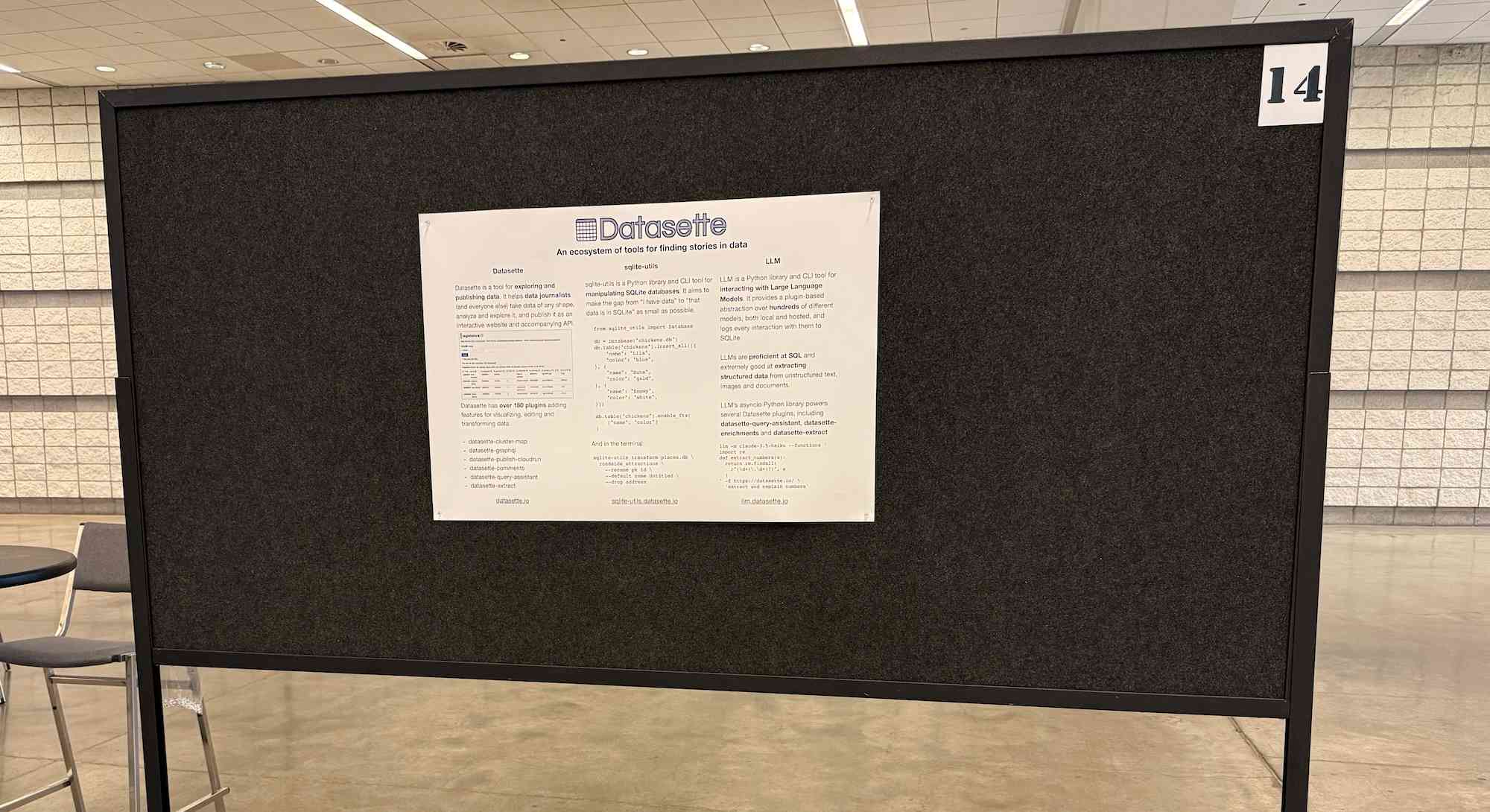
... so I headed to the nearest CVS and printed out some photos to better represent my interests and personality. I'm going for a "teenage bedroom" aesthetic here, I'm very happy with the result:
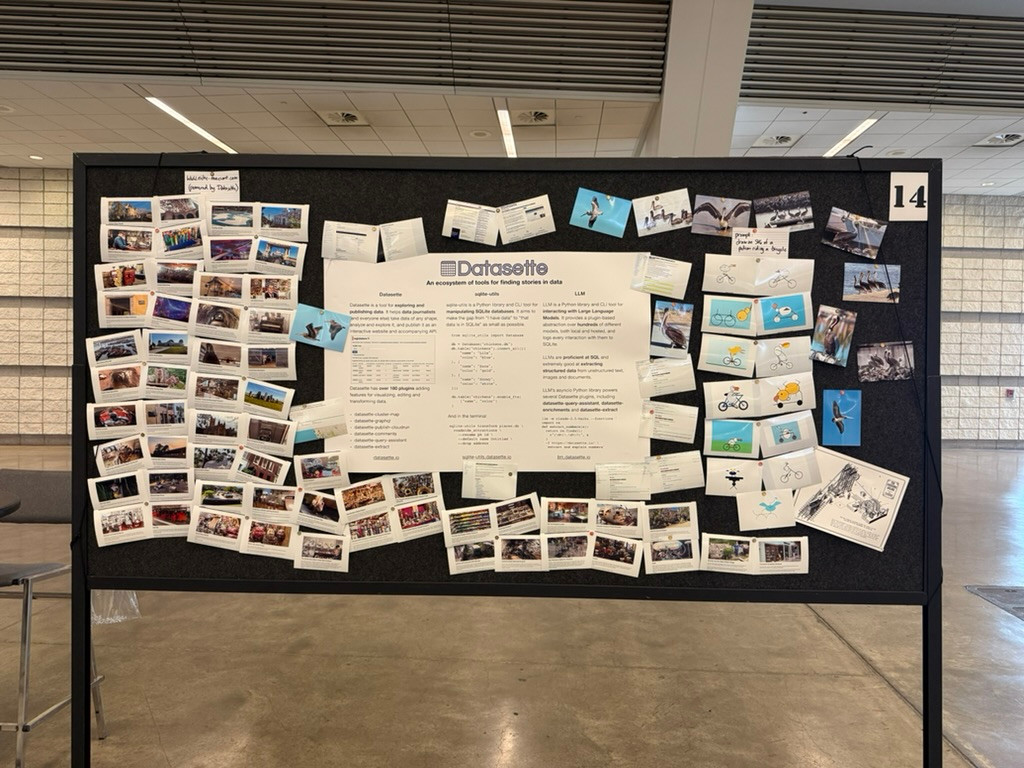
Here's the poster in the middle (also available as a PDF). It has columns for Datasette, sqlite-utils and LLM.

If you're at PyCon I'd love to talk to you about things I'm working on!
Update: Thanks to everyone who came along. Here's a 6MB photo of the poster setup. The museums were all from my www.niche-museums.com site and the pelicans riding a bicycle SVGs came from my pelican-riding-a-bicycle tag.
OpenAI Codex. Announced today, here's the documentation for OpenAI's "cloud-based software engineering agent". It's not yet available for us $20/month Plus customers ("coming soon") but if you're a $200/month Pro user you can try it out now.
At a high level, you specify a prompt, and the agent goes to work in its own environment. After about 8–10 minutes, the agent gives you back a diff.
You can execute prompts in either ask mode or code mode. When you select ask, Codex clones a read-only version of your repo, booting faster and giving you follow-up tasks. Code mode, however, creates a full-fledged environment that the agent can run and test against.
This 4 minute demo video is a useful overview. One note that caught my eye is that the setup phase for an environment can pull from the internet (to install necessary dependencies) but the agent loop itself still runs in a network disconnected sandbox.
It sounds similar to GitHub's own Copilot Workspace project, which can compose PRs against your code based on a prompt. The big difference is that Codex incorporates a full Code Interpeter style environment, allowing it to build and run the code it's creating and execute tests in a loop.
Copilot Workspaces has a level of integration with Codespaces but still requires manual intervention to help exercise the code.
Also similar to Copilot Workspaces is a confusing name. OpenAI now have four products called Codex:
- OpenAI Codex, announced today.
- Codex CLI, a completely different coding assistant tool they released a few weeks ago that is the same kind of shape as Claude Code. This one owns the openai/codex namespace on GitHub.
- codex-mini, a brand new model released today that is used by their Codex product. It's a fine-tuned o4-mini variant. I released llm-openai-plugin 0.4 adding support for that model.
- OpenAI Codex (2021) - Internet Archive link, OpenAI's first specialist coding model from the GPT-3 era. This was used by the original GitHub Copilot and is still the current topic of Wikipedia's OpenAI Codex page.
My favorite thing about this most recent Codex product is that OpenAI shared the full Dockerfile for the environment that the system uses to run code - in openai/codex-universal on GitHub because openai/codex was taken already.
This is extremely useful documentation for figuring out how to use this thing - I'm glad they're making this as transparent as possible.
And to be fair, If you ignore it previous history Codex Is a good name for this product. I'm just glad they didn't call it Ada.
Building software on top of Large Language Models
I presented a three hour workshop at PyCon US yesterday titled Building software on top of Large Language Models. The goal of the workshop was to give participants everything they needed to get started writing code that makes use of LLMs.
[... 3,726 words]LLM 0.26a0 adds support for tools! It's only an alpha so I'm not going to promote this extensively yet, but my LLM project just grew a feature I've been working towards for nearly two years now: tool support!
I'm presenting a workshop about Building software on top of Large Language Models at PyCon US tomorrow and this was the one feature I really needed to pull everything else together.
Tools can be used from the command-line like this (inspired by sqlite-utils --functions):
llm --functions ' def multiply(x: int, y: int) -> int: """Multiply two numbers.""" return x * y ' 'what is 34234 * 213345' -m o4-mini
You can add --tools-debug (shortcut: --td) to have it show exactly what tools are being executed and what came back. More documentation here.
It's also available in the Python library:
import llm def multiply(x: int, y: int) -> int: """Multiply two numbers.""" return x * y model = llm.get_model("gpt-4.1-mini") response = model.chain( "What is 34234 * 213345?", tools=[multiply] ) print(response.text())
There's also a new plugin hook so plugins can register tools that can then be referenced by name using llm --tool name_of_tool "prompt".
There's still a bunch I want to do before including this in a stable release, most notably adding support for Python asyncio. It's a pretty exciting start though!
llm-anthropic 0.16a0 and llm-gemini 0.20a0 add tool support for Anthropic and Gemini models, depending on the new LLM alpha.
Update: Here's the section about tools from my PyCon workshop.
Trying out llama.cpp’s new vision support
This llama.cpp server vision support via libmtmd pull request—via Hacker News—was merged earlier today. The PR finally adds full support for vision models to the excellent llama.cpp project. It’s documented on this page, but the more detailed technical details are covered here. Here are my notes on getting it working on a Mac.
[... 1,693 words]I had some notes in a GitHub issue thread in a private repository that I wanted to export as Markdown. I realized that I could get them using a combination of several recent projects.
Here's what I ran:
export GITHUB_TOKEN="$(llm keys get github)"
llm -f issue:https://github.com/simonw/todos/issues/170 \
-m echo --no-log | jq .prompt -r > notes.md
I have a GitHub personal access token stored in my LLM keys, for use with Anthony Shaw's llm-github-models plugin.
My own llm-fragments-github plugin expects an optional GITHUB_TOKEN environment variable, so I set that first - here's an issue to have it use the github key instead.
With that set, the issue: fragment loader can take a URL to a private GitHub issue thread and load it via the API using the token, then concatenate the comments together as Markdown. Here's the code for that.
Fragments are meant to be used as input to LLMs. I built a llm-echo plugin recently which adds a fake LLM called "echo" which simply echos its input back out again.
Adding --no-log prevents that junk data from being stored in my LLM log database.
The output is JSON with a "prompt" key for the original prompt. I use jq .prompt to extract that out, then -r to get it as raw text (not a "JSON string").
... and I write the result to notes.md.


